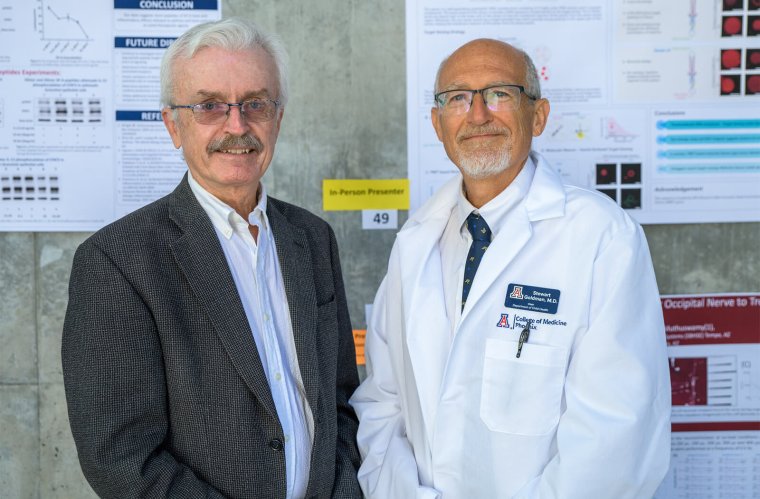
7th Annual ABRC-Flinn Research Conference highlights wide range of translational research
Translational research in pancreatic and chronic lung diseases, opioid receptors, West Nile Virus, Rocky Mountain Spotted Fever transmission, autism in older adults and insulin-dependent diabetes were among the topics discussed at the 7th ABRC-Flinn Research Conference.
Hosted at the UArizona College of Medicine – Phoenix’s Biomedical Sciences Partnership Building and featuring an online component through Whova, the daylong conference displayed the work of 15 grant awardees and 90 research posters sponsored by the Arizona Biomedical Research Centre (ABRC), Flinn Foundation and Valley Research Partnership (VRP). More than 300 people registered to attend; and its hybrid set up allowed it to go global, attracting attendees from countries like Australia, India and Poland.
Chris Glembotski, PhD, associate dean of Research and the director of the Translational Cardiovascular Research Center, expressed enthusiasm for the event and thanked the partners who helped realize it. “This exciting conference featured presentations of cutting-edge research made possible by a collaboration between the ABRC, Flinn Foundation and VRP,” he said.
Stewart Goldman, MD, chair of the University of Arizona College of Medicine – Phoenix Department of Child Health, was the keynote speaker. In his talk, “My Career: Clinical Trials, Lessons Learned,” Dr. Goldman chronicled his extensive history researching neuro-oncology in pediatric patients and the informative nature of his clinical work. “Medicine is really just about additive knowledge,” he said. Investigators are building upon the discoveries and the work that have come before.
Some of those lessons included: no matter how good a trial is, outside forces can kill it; sometimes, compromising and not running a trial exactly the way you designed it can pay off; when opportunity presents itself, jump in; encouraging results and golden opportunities still require funding; research opportunities come in many flavors; and it’s okay to try controversial ideas, just do it with integrity and intelligent design.
Dr. Goldman stressed the value of mentorship. “There’s nothing more important than being a mentor; and there’s nothing more important than having a mentor,” he said. The impact his mentors had on him played a tremendous role in his own career trajectory, and he was excited to pay that forward by sharing the wisdom he has accumulated over his career.
Dr. Goldman also serves as the senior vice president of Research and the
Sybil B. Harrington Endowed Chair of Pediatric Oncology at Phoenix Children’s.
The featured speaker for the event was Rachna Shroff, MD, MS, director of the UArizona Cancer Center Clinical Trials Office and associate dean of Clinical and Translational Research at the UArizona College of Medicine – Tucson.
Dr. Shroff’s presentation, “Biliary Cancers – We are Closing the GAP!”, focused on intrahepatic and extrahepatic carcinomas — or advanced versions of bile duct and gallbladder cancers.
“This is a disease that has been historically thought of as a rare, heterogenous group of malignancies that was ‘orphan’ and over the last decade, it has been, I think, a wonderful example of precision oncology and incredible drug development,” she said.
Read more from the University of Arizona College of Medicine – Phoenix.
The Phoenix Bioscience Core is home to all three of the state’s public research institutions, including the University of Arizona. The PBC often highlights research happening around the universities, companies and other organizations, which you can read here.
More news from the PBC
- Arizona biosciences set record highs in research funding, show increasing competitiveness
- Mayor’s Impact Driven Roundtable with HealthTech Leaders
- XLR8 PBC Ushers in a New Wave of Health Tech Innovation
- NurseIO Announces Formation of Distinguished Advisory Board to Propel Healthcare Workforce Innovation
- $5 million gift to provide scholarships for new ASU medical school students
- Exact Sciences Launches the Cologuard™ Plus Test, Transforming Colorectal Cancer Screening
- Tyler Gallo, PharmD, Receives ABRC Grant on Heparin-induced Thrombocytopenia
